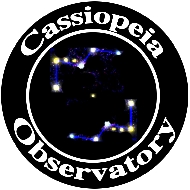Triple Conjunction,
NGC1501 & NGC1535 UHC OIII filters
Posted: 12 January 2021
Sunday, 10 January 2021, was clear until sunset when clouds appeared. The sky cleared mid-day on Monday, 11 January.
|
Open: Monday, 11 January 2021, 1814 MST Temperature: 55°F |
Session: 1586 Conditions: Clear, breezy |
Equipment:
12" f/8 LX600 w/StarLock
2" 24mm UWA eyepiece
Filter Slider
2" UHC filter
2" OIII filter
Camera:
D850 DSLR
1820 MST: LX600 ON, StarLock OFF, High Precision OFF.
1822 MST: viewed the planet Mercury, low in the western sky, 102X.
Viewed Jupiter and Mercury, 12x50 binoculars. Saturn was not visible from the observatory as it was too low in the sky.
1825 MST: I went outside of the observatory and moved to a higher elevation. This D850 DSLR photo (f/5.6, 1/30sec, ISO 3200, FL 300mm) shows all three planets.

Mouseover or tap on image for labels
Returned to the observatory.
1835 MST: High Precision ON.
Viewed NGC1501 (planetary nebula), 102X. Then viewed NGC1535 (planetary nebula), 102X.
Began preparing to image the two nebulae. Mounted the D850 DSLR at prime focus using the Filter Slider, focused on the star Capella with the UHC filter, and locked the 12" primary mirror.
1910 MST: StarLock ON.
Took the following StarLock autoguided images (unedited) of NGC1501.
UHC filter (3 minutes, ISO 6400, White Balance 4000K)

OIII filter (5 minutes, ISO 6400, White Balance 4000K)

The images were merged and edited with this result.
NGC1501

Then took the following StarLock autoguided images (unedited) of NGC1535.
UHC filter (30 seconds, ISO 6400, White Balance 4000K)

OIII filter (60 seconds, ISO 6400, White Balance 4000K)

The images were merged and edited with this result.
NGC1535

2003 MST: StarLock OFF, High Precision OFF.
Viewed NGC2024 (Flame Nebula), 102X. SYNCed on the nebula in preparation of imaging it on the next session. It was getting too windy to continue imaging this night.
2022 MST: LX600 OFF.
|
Close: Monday, 11 January 2021, 2035 MST Temperature: 42°F |
Session Length: 2h 21m Conditions: Clear, windy |
Comments are welcome using Email. Twitter users can use the button below to tweet this report to their followers. Thanks.
Cassiopeia Observatory Home Page
Copyright ©2021 Michael L. Weasner / mweasner@me.com
URL = http://www.weasner.com/co/Reports/2021/01/12/index.html
